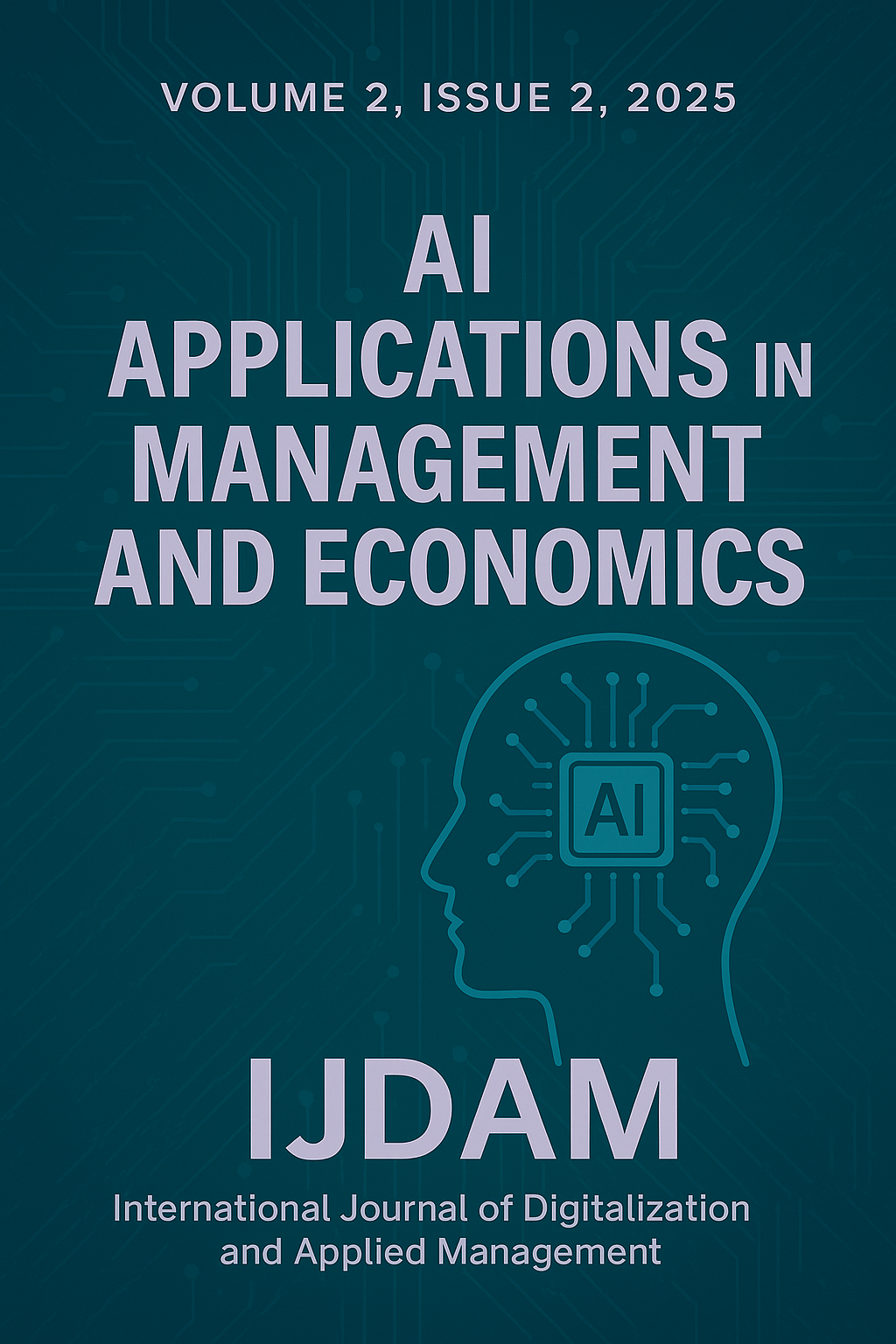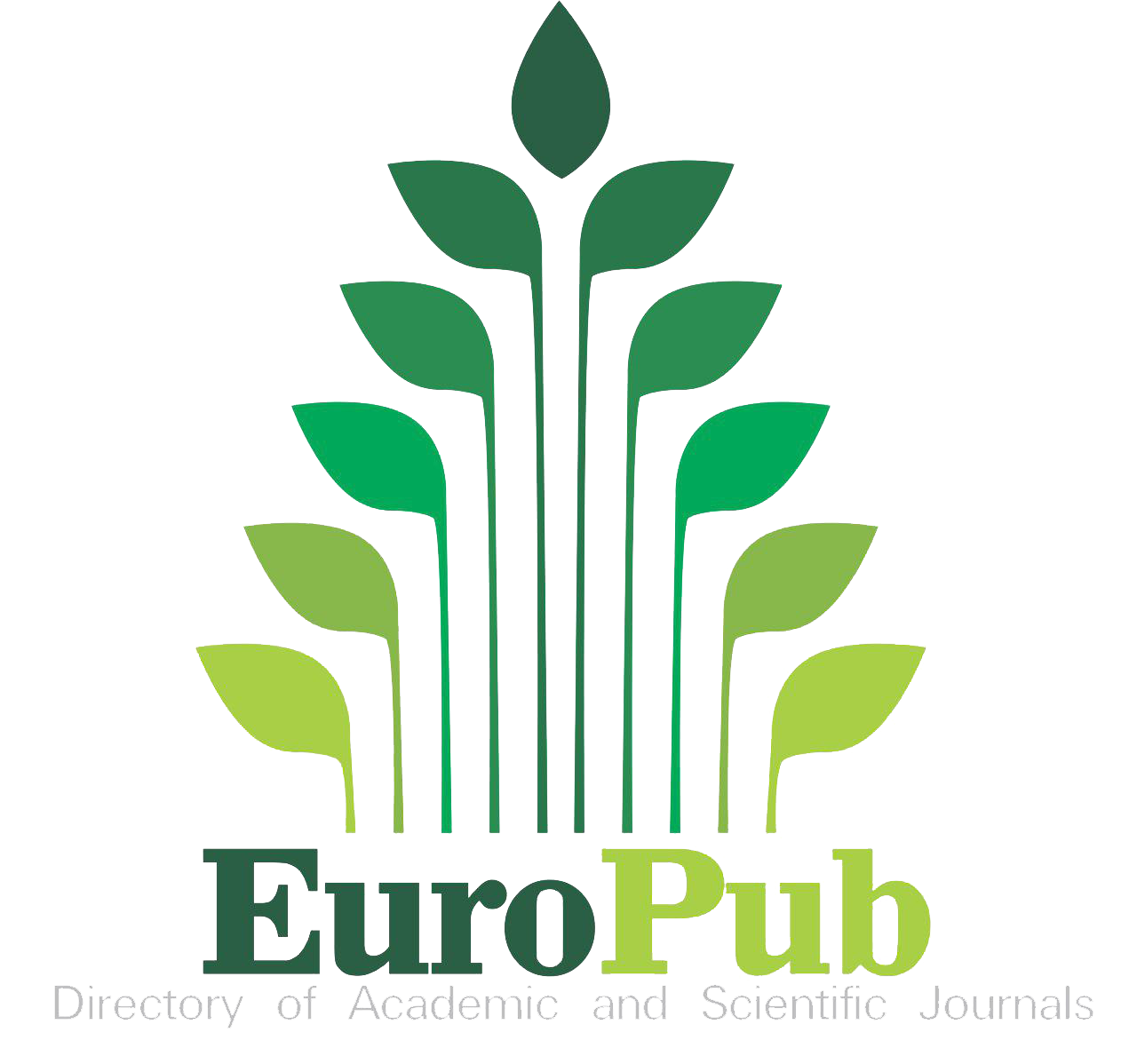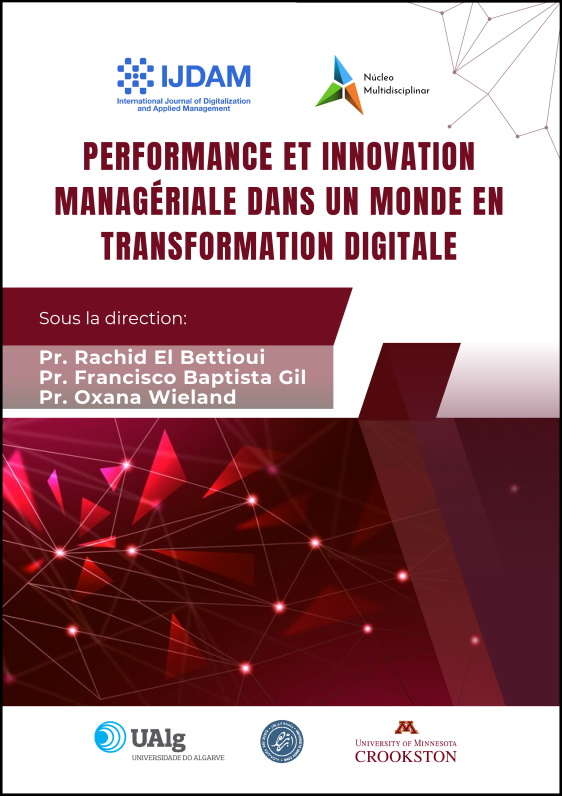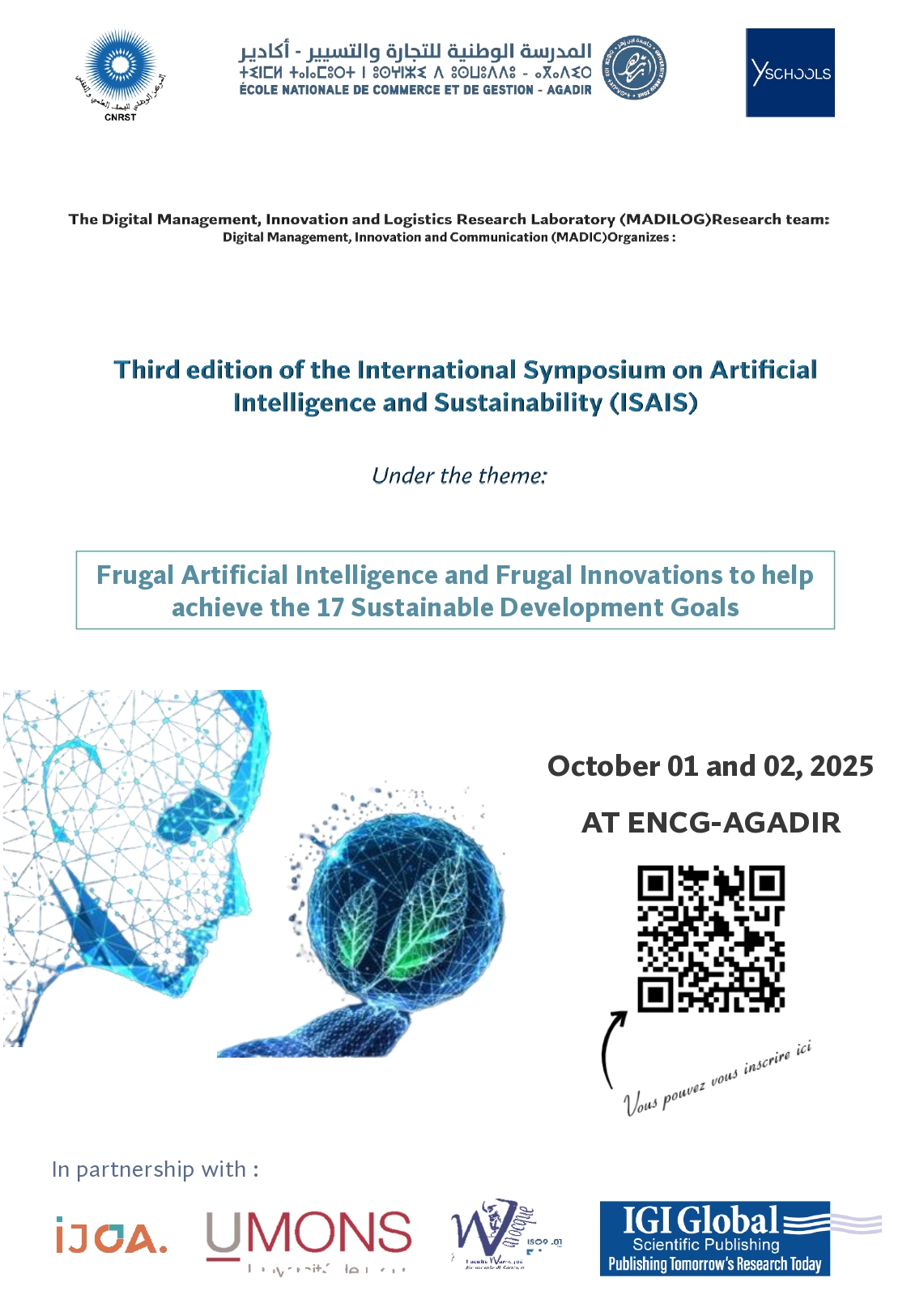Rethinking the adoption of artificial intelligence in higher education:
a bibliometric study of barriers, ethical issues, and governance challenges
DOI:
https://doi.org/10.23882/ijdam.25216Keywords:
Artificial Intelligence, Higher Education, Bibliometric Analysis, Governance, EthicsAbstract
This paper presents a bibliometric analysis of recent research on the integration of artificial intelligence (AI) in higher education, with a particular focus on the obstacles encountered, the ethical dilemmas raised, and the associated governance issues. The study is based on a corpus of 803 peer-reviewed articles extracted from the Web of Science database for the period 2020–2024.
The analysis was conducted using the VOSviewer and Biblioshiny tools, which identified the most frequently co-occurring keywords, major contributors, global collaboration networks, and structuring thematic clusters.
The results highlight a strong focus on technology acceptance models (particularly UTAUT and TAM) and the pedagogical integration of AI. However, several critical gaps remain, particularly regarding personal data protection, algorithmic bias, the lack of robust regulatory frameworks, and the underrepresentation of developing countries in scientific publications and academic collaboration networks.
The study highlights the importance of strengthening ethical governance mechanisms, developing inclusive policies to support the growth of AI in the Global South, and promoting more balanced scientific partnerships at the international level.
References
Almenar, R., Tricco, G., Ayers, K., Ben Moussa, R., Graham, T., Iyiola, S., Lee, S., Nemcova, T., Joshua Opota, A., Sharma, T., Toh, R., & Yuan, J. (2024). The Protection of AI-Based Space Systems from a Data-Driven Governance Perspective. IISL Colloquium on the Law of Outer Space, 238‑263. https://doi.org/10.52202/078384-0024
Aria, M., & Cuccurullo, C. (2017). bibliometrix : An R-tool for comprehensive science mapping analysis. Journal of Informetrics, 11(4), 959 975. https://doi.org/10.1016/j.joi.2017.08.007
Benatiya Andaloussi, M. (2024). A Bibliometric Literature Review of Digital Supply Chain : Trends, Insights, and Future Directions. Sage Open, 14(2), 21582440241240340. https://doi.org/10.1177/21582440241240340
Bouhazzama, M., & Guenaoui, A. (s. d.). THE MOROCCAN WOMEN’S COOPERATIVE IN RESPONSE TO LASTING IMPACTS: SOCIAL COHESION, SOLIDARITY AND INCLUSION.
Chan, C., & Colloton, T. (2024). Generative AI in Higher Education : The ChatGPT Effect. https://doi.org/10.4324/9781003459026
Chan, C. K. Y., & Hu, W. (2023). Students’ voices on generative AI : Perceptions, benefits, and challenges in higher education. International Journal of Educational Technology in Higher Education, 20(1), 43. https://doi.org/10.1186/s41239-023-00411-8
Cobo, M. j., López-Herrera, A. g., Herrera-Viedma, E., & Herrera, F. (2011). Science mapping software tools : Review, analysis, and cooperative study among tools. Journal of the American Society for Information Science and Technology, 62(7), 1382 1402. https://doi.org/10.1002/asi.21525
Donthu, N., Kumar, S., Mukherjee, D., Pandey, N., & Lim, W. M. (2021). How to conduct a bibliometric analysis : An overview and guidelines. Journal of Business Research, 133, 285 296. https://doi.org/10.1016/j.jbusres.2021.04.070
Dwivedi, Y. K., Hughes, L., Ismagilova, E., Aarts, G., Coombs, C., Crick, T., Duan, Y., Dwivedi, R., Edwards, J., Eirug, A., Galanos, V., Ilavarasan, P. V., Janssen, M., Jones, P., Kar, A. K., Kizgin, H., Kronemann, B., Lal, B., Lucini, B., … Williams, M. D. (2021). Artificial Intelligence (AI) : Multidisciplinary perspectives on emerging challenges, opportunities, and agenda for research, practice and policy. International Journal of Information Management, 57, 101994. https://doi.org/10.1016/j.ijinfomgt.2019.08.002
Dwivedi, Y. K., Sharma, A., Rana, N. P., Giannakis, M., Goel, P., & Dutot, V. (2023). Evolution of Artificial Intelligence Research in Technological Forecasting and Social Change: Research Topics, Trends, and Future Directions. Technological Forecasting and Social Change, 192, Article ID: 122579.
https://doi.org/10.1016/j.techfore.2023.122579
EL Gareh, F., Elmenssouri, A., Oulamine, A., & Hussain, Z. (2025). A PRISMA-Based Systematic Review on Organizational Commitment and Logistic Performance. In Knowledge Sharing and Fostering Collaborative Business Culture (p. 213‑240). IGI Global Scientific Publishing. https://doi.org/10.4018/979-8-3373-0710-7.ch012
Kumar, S., Rao, P., Singhania, S., Verma, S., & Kheterpal, M. (2024). Will artificial intelligence drive the advancements in higher education? A tri-phased exploration. Technological Forecasting and Social Change, 201, 123258. https://doi.org/10.1016/j.techfore.2024.123258
Leite, H. (2025). Artificial intelligence in higher education : Research notes from a longitudinal study. Technological Forecasting and Social Change, 215, 124115. https://doi.org/10.1016/j.techfore.2025.124115
Matos, T., Santos, W., Zdravevski, E., Coelho, P. J., Pires, I. M., & Madeira, F. (2025). A systematic review of artificial intelligence applications in education : Emerging trends and challenges. Decision Analytics Journal, 15, 100571. https://doi.org/10.1016/j.dajour.2025.100571
Mienye, I. D., & Swart, T. G. (2025). ChatGPT in Education : A Review of Ethical Challenges and Approaches to Enhancing Transparency and Privacy. Procedia Computer Science, 254, 181‑190. https://doi.org/10.1016/j.procs.2025.02.077
Mohsin Khan, M., Shah, N., Shaikh, N., Thabet, A., Alrabayah, T., & Belkhair, S. (2025). Towards secure and trusted AI in healthcare : A systematic review of emerging innovations and ethical challenges. International Journal of Medical Informatics, 195, 105780. https://doi.org/10.1016/j.ijmedinf.2024.105780
Oulamine, A., Hattabou, A., El Gareh, F., & Ray, A. (2024). University Students’ Perceptions of e-Learning Barriers in Morocco : A Qualitative Exploratory Study. Ubiquitous Learning, 18(1), 27.
Oulamine, A., Hattabou, A., Ray, A., Gareh, F. E., & Alourhzal, H. (2025). Exploring barriers affecting e-learning usage intentions among Moroccan university students. International Journal of Management in Education, 19(2), 186‑211. https://doi.org/10.1504/IJMIE.2025.144727
Oncioiu, I., & Bularca, A. R. (2025). Artificial Intelligence Governance in Higher Education: The Role of Knowledge-Based Strategies in Fostering Legal Awareness and Ethical Artificial Intelligence Literacy. Societies, 15(6), 144. https://doi.org/10.3390/soc15060144
Page, M. J., McKenzie, J. E., Bossuyt, P. M., Boutron, I., Hoffmann, T. C., Mulrow, C. D., Shamseer, L., Tetzlaff, J. M., Akl, E. A., Brennan, S. E., Chou, R., Glanville, J., Grimshaw, J. M., Hróbjartsson, A., Lalu, M. M., Li, T., Loder, E. W., Mayo-Wilson, E., McDonald, S., … Moher, D. (2021). The PRISMA 2020 statement : An updated guideline for reporting systematic reviews. BMJ, 372, n71. https://doi.org/10.1136/bmj.n71
Pasas-Farmer, S., & Jain, R. (2025). From discovery to delivery : Governance of AI in the pharmaceutical industry. Green Analytical Chemistry, 13, 100268. https://doi.org/10.1016/j.greeac.2025.100268
Perdana, A., Arifin, S., & Quadrianto, N. (2025). Algorithmic trust and regulation : Governance, ethics, legal, and social implications blueprint for Indonesia’s central banking. Technology in Society, 81, 102838. https://doi.org/10.1016/j.techsoc.2025.102838
Prasetya, F., Fortuna, A., Samala, A. D., Latifa, D. K., Andriani, W., Gusti, U. A., Raihan, M., Criollo-C, S., Kaya, D., & Cabanillas García, J. L. (2025). Harnessing artificial intelligence to revolutionize vocational education : Emerging trends, challenges, and contributions to SDGs 2030. Social Sciences & Humanities Open, 11, 101401. https://doi.org/10.1016/j.ssaho.2025.101401
Sahar, R., & Munawaroh, M. (2025). Artificial intelligence in higher education with bibliometric and content analysis for future research agenda. Discover Sustainability, 6(1), 401. https://doi.org/10.1007/s43621-025-01086-z
Schwendicke, F., Samek, W., & Krois, J. (2020). Artificial Intelligence in Dentistry : Chances and Challenges. Journal of Dental Research, 99(7), 769 774. https://doi.org/10.1177/0022034520915714
Singh, V. K., Singh, P., Karmakar, M., Leta, J., & Mayr, P. (2021). The journal coverage of Web of Science, Scopus and Dimensions : A comparative analysis. Scientometrics, 126(6), 5113 5142.
Spitzeck, H., Boechat, C., & França Leão, S. (2013). Sustainability as a driver for innovation – towards a model of corporate social entrepreneurship at Odebrecht in Brazil. Corporate Governance: The International Journal of Business in Society, 13(5), 613‑625. https://doi.org/10.1108/CG-06-2013-0080
Stattman, S. L., & Mol, A. P. J. (2014). Social sustainability of Brazilian biodiesel : The role of agricultural cooperatives. Geoforum, 54, 282‑294. https://doi.org/10.1016/j.geoforum.2014.04.001
Tlili, A., Shehata, B., Adarkwah, M. A., Bozkurt, A., Hickey, D. T., Huang, R., & Agyemang, B. (2023). What if the devil is my guardian angel : ChatGPT as a case study of using chatbots in education. Smart Learning Environments, 10(1), 15. https://doi.org/10.1186/s40561-023-00237-x
Tun, H. M., Naing, L., Malik, O. A., & Rahman, H. A. (2025). Navigating ASEAN region Artificial Intelligence (AI) governance readiness in healthcare. Health Policy and Technology, 14(2), 100981. https://doi.org/10.1016/j.hlpt.2025.100981
Valencia-Arias, A., Jimenez Garcia, J. A., Alvites Adan, T. E., Martínez Rojas, E., Valencia, J., Agudelo-Ceballos, E., Uribe Bedoya, H., & Moreno López, G. A. (2025). Trends in the sustainable use of artificial intelligence : A bibliometric approach. Discover Sustainability, 6(1), 374. https://doi.org/10.1007/s43621-025-01222-9
van Eck, N. J., & Waltman, L. (2010). Software survey : VOSviewer, a computer program for bibliometric mapping. Scientometrics, 84(2), 523 538. https://doi.org/10.1007/s11192-009-0146-3
Wang, H., Dang, A., Wu, Z., & Mac, S. (2024). Generative AI in higher education : Seeing ChatGPT through universities’ policies, resources, and guidelines. Computers and Education: Artificial Intelligence, 7, 100326. https://doi.org/10.1016/j.caeai.2024.100326
Yang, B. X., Zhou, F., Bai, N., Zhou, S., Luo, C., Wang, Q., Wong, A. K. C., & Lin, F. (2025). Digital and Intelligence Education in Medicine : A Bibliometric and Visualization Analysis Using CiteSpace and VOSviewer. Frontiers of Digital Education, 2(1), 10. https://doi.org/10.1007/s44366-025-0046-y
Zupic, I., & Čater, T. (2015). Bibliometric Methods in Management and Organization. Organizational Research Methods, 18(3), 429 472. https://doi.org/10.1177/1094428114562629
Downloads
Published
How to Cite
Issue
Section
License
Copyright (c) 2025 Afafe ELAMRANI ELHASSANI , Ayoub OULAMINE, Fatima ELBARHOUMI

This work is licensed under a Creative Commons Attribution-NonCommercial 4.0 International License.


 Portugal
Portugal










